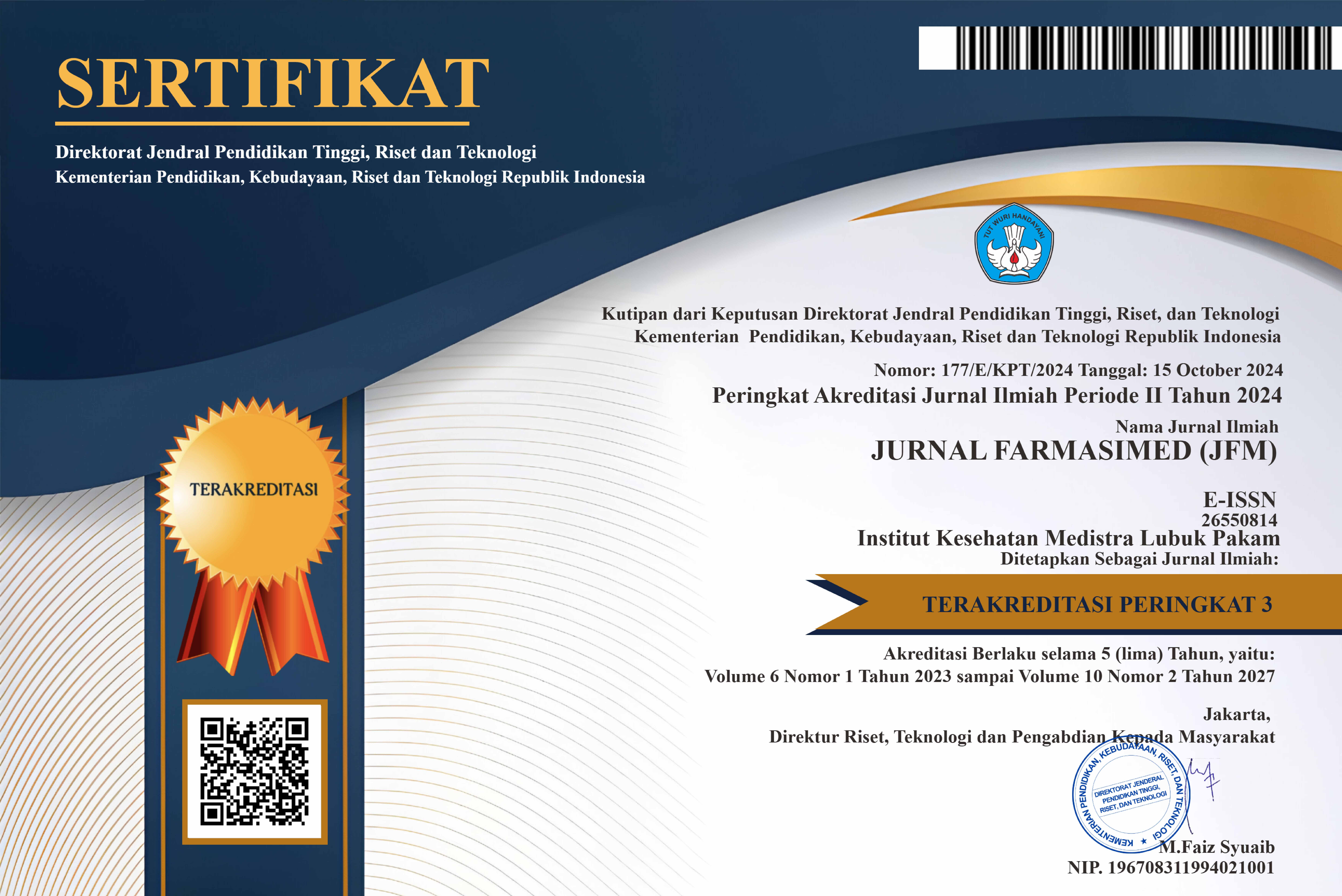Association of Pharmacist-Provided Medication Counselingwith Adherence in Outpatients
DOI:
https://doi.org/10.35451/p6jqac58Keywords:
Medication Counseling, Pharmacist, Medication Adherence, OutpatientsAbstract
Background: patient medication adherence is critical for therapeutic success. Pharmacist-provided medication counseling can enhance patients' understanding and adherence to treatment regimens. Objective: this study aimed to assess the relationship between pharmacist-provided counseling and medication adherence among outpatients at RSU. Sembiring Delitua. Research Methods: a quantitative study with a cross-sectional design was conducted. A total of 100 outpatients were selected using purposive sampling. Data were collected using a structured questionnaire evaluating counseling quality and adherence through the MMAS-8 scale. The Chi-square test was used for statistical analysis at a significance level of p<0.05. Results: Sixty percent of patients reported receiving counseling, but only 21% received complete counseling. Medication adherence levels showed that 42% had high adherence. Statistical analysis revealed a significant association between medication counseling and adherence (p=0.002), where patients receiving counseling had higher adherence rates. Conclusion: pharmacist-led medication counseling is significantly associated with higher medication adherence among patients. Hospitals are advised to improve the quality and coverage of medication counseling through continuous pharmacist training and the use of supplementary educational media.
Downloads
References
[1] Al-Shaqsi, S. Z., & Al-Ghafri, S. (2017). The role of pharmacists in improving medication adherence: A review. Journal of Clinical Pharmacy and Therapeutics, 42(1), 3-10. https://doi.org/10.1111/jcpt.12440
[2] Allemann, S. S., van Mil, J. W., & Schaefer, M. A. (2018). The role of the pharmacist in enhancing medication adherence: A review of current evidence and future directions. Pharmaceutical Care and Health Systems, 6(2), 68-76.
[3] Ardjosoediro, I. S., & Zulkarnain, I. (2021). Pengaruh konseling obat terhadap kepatuhan minum obat pada pasien hipertensi di RSU Jakarta. Jurnal Farmasi Indonesia, 28(4), 250-256.
[4] Budiman, I. A., & Oktavia, D. (2020). Pengaruh konseling obat oleh apoteker terhadap kepatuhan terapi pada pasien diabetes mellitus tipe 2. Jurnal Manajemen & Pelayanan Farmasi, 6(1), 45-53.
[5] Cheraghali, A. M., & Rezaei, A. (2020). Medication adherence and the role of the pharmacist. Journal of Pharmacy Practice and Research, 50(3), 215-223.
[6] Chong, W. W., & Tan, M. A. (2019). Enhancing medication adherence through pharmacy interventions: A review. International Journal of Clinical Pharmacy, 41(2), 287-295.
[7] Cramer, J. A., & Roy, S. (2018). Medication adherence: A review of the literature. Journal of Clinical Pharmacology, 58(7), 890-895.
[8] De Las Cuevas, C., & Sanz, E. J. (2019). Pharmacist-led interventions for improving adherence in patients with chronic conditions. Journal of Clinical Pharmacy and Therapeutics, 44(4), 565-573. https://doi.org/10.1111/jcpt.13052
[9] Diani, L., & Martono, J. (2019). Faktor-faktor yang memengaruhi kepatuhan pasien dalam penggunaan obat anti-tuberkulosis di Puskesmas Jakarta. Jurnal Kesehatan Masyarakat, 6(2), 124-131.
[10] Hanafiah, M. N., & Salim, R. (2017). Pengaruh konseling obat oleh apoteker terhadap kepatuhan minum obat pasien hipertensi. Jurnal Farmasi Klinis, 10(3), 121-127.
[11] Hoh, S. K., & Tan, B. T. (2019). The impact of pharmacist-led medication counseling on adherence among patients with chronic disease. Pharmacology & Therapeutics, 31(6), 478-484.
[12] Krousel-Wood MA, Islam T, Webber LS, Re RN, Morisky DE, Muntner P. New medication adherence scale versus pharmacy fill rates in seniors with hypertension. Am J Manag Care. 2009;15(1):59–66. Available from: https://pubmed.ncbi.nlm.nih.gov/19146365/
[13] Osterberg L, Blaschke T. Adherence to medication. N Engl J Med. 2005;353(5):487–97. Available from: https://www.nejm.org/doi/10.1056/NEJMra050100
[14] Widayati A, Suryawati S, de Crespigny C, Hiller JE. Self-medication with antibiotics in Yogyakarta City Indonesia: a cross sectional population-based survey. BMC Res Notes. 2011;4:491. Available from: https://doi.org/10.1186/1756-0500-4-491
[15] Suharjo S, Nugroho A, Putri A. Hubungan pemberian informasi obat dengan kepatuhan pasien dalam penggunaan obat antihipertensi di Puskesmas. J Ilmu dan Teknologi Kesehatan. 2019;6(2):111–9.
[16] Syam SM, Novrianti I, Ubrusun J. Gambaran pelaksanaan standar pelayanan kefarmasian di Puskesmas Kota Tarakan tahun 2024. Jurnal Farmasimed (JFM). 2025;7(2). Available from: https://doi.org/10.35451/jfm.v7i2.2439
[17] Sari Y, Hidayat N, Rachmawati R. Effect of pharmacist counseling on medication adherence and asthma control in Yogyakarta. J Pharm Pract Community Med. 2020;6(1):23–8.
[18] Masdin M, Hartati S, Sari RN. The effect of pharmacist-led counseling on glycemic control in type 2 diabetes patients at East Jakarta. J Diabetes Res Clin Metab. 2021;10(3):45–50.
[19] Husnawati H, Rahmawati D, Andriani R. Collaboration between pharmacists, health workers and family in improving medication adherence among elderly hypertensive patients in rural areas. J Pharm Care. 2022;8(1):12–7.
[20] Pratiwi W, Anwar S. Barriers to effective pharmaceutical care: Lack of private counseling room, workload, and training gaps. Indones J Pharm Sci. 2019;15(2):87–94.
Downloads
Published
Issue
Section
License
Copyright (c) 2025 Samran

This work is licensed under a Creative Commons Attribution-NoDerivatives 4.0 International License.
Copyright in each article is the property of the Author.

























